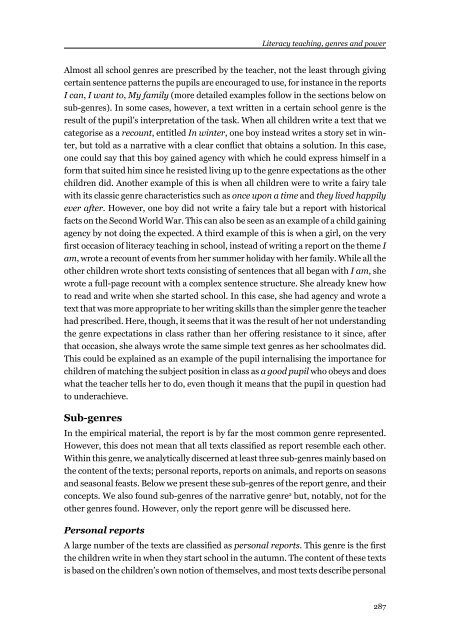Download issue - Umeå universitet
Download issue - Umeå universitet
Download issue - Umeå universitet
Create successful ePaper yourself
Turn your PDF publications into a flip-book with our unique Google optimized e-Paper software.
Literacy teaching, genres and power<br />
Almost all school genres are prescribed by the teacher, not the least through giving<br />
certain sentence patterns the pupils are encouraged to use, for instance in the reports<br />
I can, I want to, My family (more detailed examples follow in the sections below on<br />
sub-genres). In some cases, however, a text written in a certain school genre is the<br />
result of the pupil’s interpretation of the task. When all children write a text that we<br />
categorise as a recount, entitled In winter, one boy instead writes a story set in winter,<br />
but told as a narrative with a clear conflict that obtains a solution. In this case,<br />
one could say that this boy gained agency with which he could express himself in a<br />
form that suited him since he resisted living up to the genre expectations as the other<br />
children did. Another example of this is when all children were to write a fairy tale<br />
with its classic genre characteristics such as once upon a time and they lived happily<br />
ever after. However, one boy did not write a fairy tale but a report with historical<br />
facts on the Second World War. This can also be seen as an example of a child gaining<br />
agency by not doing the expected. A third example of this is when a girl, on the very<br />
first occasion of literacy teaching in school, instead of writing a report on the theme I<br />
am, wrote a recount of events from her summer holiday with her family. While all the<br />
other children wrote short texts consisting of sentences that all began with I am, she<br />
wrote a full-page recount with a complex sentence structure. She already knew how<br />
to read and write when she started school. In this case, she had agency and wrote a<br />
text that was more appropriate to her writing skills than the simpler genre the teacher<br />
had prescribed. Here, though, it seems that it was the result of her not understanding<br />
the genre expectations in class rather than her offering resistance to it since, after<br />
that occasion, she always wrote the same simple text genres as her schoolmates did.<br />
This could be explained as an example of the pupil internalising the importance for<br />
children of matching the subject position in class as a good pupil who obeys and does<br />
what the teacher tells her to do, even though it means that the pupil in question had<br />
to underachieve.<br />
Sub-genres<br />
In the empirical material, the report is by far the most common genre represented.<br />
However, this does not mean that all texts classified as report resemble each other.<br />
Within this genre, we analytically discerned at least three sub-genres mainly based on<br />
the content of the texts; personal reports, reports on animals, and reports on seasons<br />
and seasonal feasts. Below we present these sub-genres of the report genre, and their<br />
concepts. We also found sub-genres of the narrative genre 2 but, notably, not for the<br />
other genres found. However, only the report genre will be discussed here.<br />
Personal reports<br />
A large number of the texts are classified as personal reports. This genre is the first<br />
the children write in when they start school in the autumn. The content of these texts<br />
is based on the children’s own notion of themselves, and most texts describe personal<br />
287

















